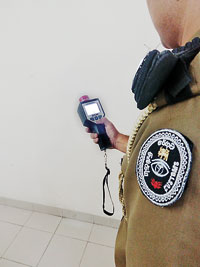News
Customs to expand radiological surveillance capabilities at BIA
Sri Lanka Customs is planing to expand its radiological surveillance capabilities to the Bandaranaike International Airport (BIA).
Currently, Customs operates a networked radiological alarms system and specialised investigative team at the Colombo port. Late last year seven consignments of cargo inbound to Sri Lanka were ordered to be shipped back to their place of origin due to unsafe levels of radiation.
 The last consignment ordered to be returned was a container full of Pine wood panels which was identified to be contaminated with isotope Cesium 137, said Ajith Siriwardhana, Chief Assistant Preventive Officer, Sri Lanka Customs. The Pine wood panels are suspected to have originated from a forest reserve near Chernobyl near the Ukrainian border.
The last consignment ordered to be returned was a container full of Pine wood panels which was identified to be contaminated with isotope Cesium 137, said Ajith Siriwardhana, Chief Assistant Preventive Officer, Sri Lanka Customs. The Pine wood panels are suspected to have originated from a forest reserve near Chernobyl near the Ukrainian border.
The Megaport Surveillance Unit of the Customs monitors a network of radiological alarms at all the gates leading in and out of each terminal at Colombo Port, at a centralised monitoring station which is manned 24 hours. The small specialised unit is trained and equipped with fixed and portable radiological spectrum analysis equipment which can detect both neutron and proton practical emission. Recently, a new batch of hand-held detectors were received from Inter-Pol and the International Atomic Energy Agency (IAEA).
The new equipment allow mobile random checks to be conducted, and any particle emission to be quickly identified and isolated, Mr Siriwardhana claimed. The Customs receive technical support and assistance from the Sri Lanka Atomic Energy Board (SLAEB) and the Atomic Energy Regulatory Council (SLAERC).
The Colombo port processes 3,000-3,500 container units daily, of which on average between 100-150 units are flagged by the surveillance system, Mr Siriwardhana said, pointing out that the majority of the cargo flagged for inspection contain naturally occurring radioactive emissions which are not hazardous. However, checking for the presence of radiological contamination is vital for national security and public health, he points out. “If cargo is not screened effectively, there could be food security and national security consequences,” he explained. “There is a need for greater public awareness on the issue,” he opined.
Due to the specialised nature of the duties performed, continued training and refresher training is needed to fulfill the required number of officers to man the operation on a 24-hour basis around the year.
While the Customs has jurisdiction to monitor and enforce regulations regarding the Radiological, Chemical, Biological and Nuclear (CBRN) hazards at the border and entry points to the country, internal surveillance, response, security and transportation of such material is handled by the Special Task Force (STF). The armed forces also maintain several CBRN detection and response teams around the island.
During the last few years there had been several instances where imported vehicle spare parts in cargo consignments were flagged for being contaminated with hazardous levels of radioactive isotopes such as Cesium 137 (Cs 137), Cobalt 60, Thorium 232 (Th 232) and Radium. Such hazardous cargo is detained and reshipped to its origin by the Customs.

